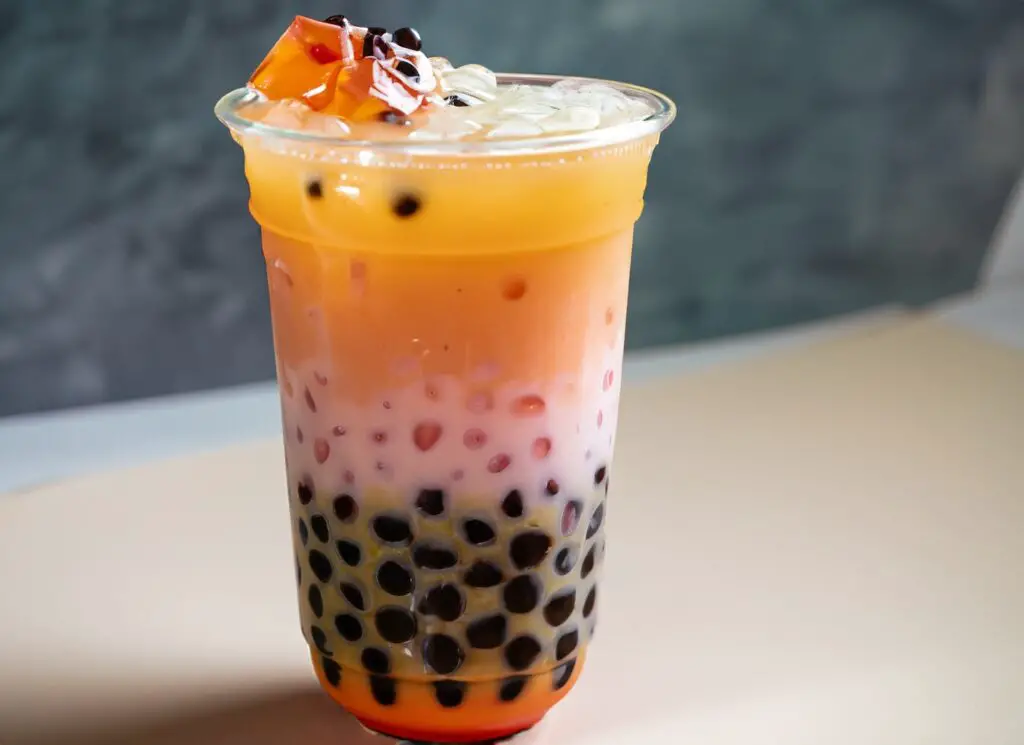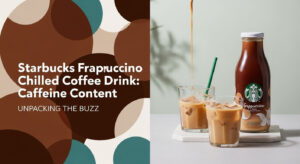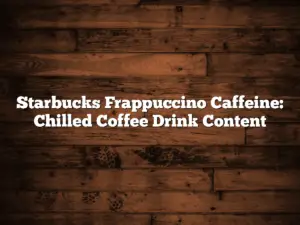As an Amazon Associate CoffeeXplore.com earns from qualifying purchases.
Does Bubble Tea Have Caffeine? Find Out
Are you a bubble tea lover who’s curious about the caffeine content of your favorite beverage? Or maybe you’re health-conscious and want to know if bubble tea is a good choice for your caffeine intake. Whatever your reason for wondering about the caffeine content of bubble tea, you’ve come to the right place.
As an expert in the food and beverage industry, I’ve researched and tested the caffeine content of bubble tea extensively. In this article, I’ll answer the burning question: does bubble tea have caffeine? I’ll also provide information on the different types of bubble tea and their caffeine content, as well as caffeine-free alternatives for those who want to enjoy bubble tea without caffeine.
By the end of this post, you’ll have a clear understanding of the caffeine content of bubble tea and be able to make informed choices about your beverage consumption. So, let’s dive in and find out if your favorite bubble tea has caffeine.
Does Bubble Tea Contain Caffeine?

Yes, most bubble tea contains caffeine since it is made with tea leaves. The caffeine content varies depending on the type of tea used, preparation methods, and serving size.
What is Bubble Tea?
Bubble tea, also called boba tea or pearl milk tea, originated in Taiwan in the 1980s and has quickly become a worldwide phenomenon. It is often served with chewy tapioca pearls added to it, which give the drink its signature texture. The drink can be made with a variety of tea types, such as black tea, green tea, oolong tea, herbal tea, Chai Latte or even coffee.
What is Caffeine?
Caffeine is a natural stimulant found in coffee, tea, and some energy drinks. It acts on the central nervous system to improve alertness and wakefulness. However, excessive caffeine intake can lead to negative effects like anxiety, insomnia, or jitteriness.
According to research, an average adult can consume up to 400mg of caffeine per day without adverse effects.
Caffeine Content in Bubble Tea
| Tea Type | Caffeine Content (per cup) |
|---|---|
| Black tea | 40-50mg |
| Green tea | 20-30mg |
| Fruit tea | 30-40mg |
| Herbal tea | 0mg |
Black tea-based bubble tea contains the highest amount of caffeine, with an average of 40-50mg per cup. Green tea-based bubble tea contains an average of 20-30mg per cup, while fruit tea contains slightly less caffeine than regular black tea, ranging from 30-40mg of caffeine.
Herbal teas are caffeine-free. Bubble tea is relatively low in caffeine with an overall average of 50mg per cup. However, the actual caffeine content can vary depending on the brewing method and serving size.
Caffeine Free Bubble Tea
If you’re looking for caffeine-free bubble tea options, here are some ideas from the search results:
- Fruit teas: Many places offer fruit-flavored bubble teas that are caffeine-free.
- Matcha-based drinks: While matcha does contain caffeine, it has less caffeine than coffee and some people may be able to tolerate it.
- Rooibos tea: Rooibos is a South African tea that is naturally caffeine-free and can be used to make milk tea.
- Chamomile or lavender milk tea: These are good options for those who want a relaxing, caffeine-free drink.
- Bubble tea kits: There are many boba tea kits available that are caffeine-free, such as those offered by Tea Drops.
Bubble Tea Variants and Their Caffeine Content
Black tea is the most commonly used tea base in bubble tea, making it the most caffeinated option. However, other tea types like green tea, matcha, and jasmine tea are also used to make bubble tea. Each variant has a different caffeine content, with green tea and decaf tea containing little to no caffeine.
Here’s a list of bubble tea variants and their caffeine content:
- Black tea: 40-50mg/cup
- Green tea: 20-30mg/cup
- Jasmine tea: 15-20mg/cup
- Oolong tea: 30-35mg/cup
- Matcha: 70mg/cup
- Decaf tea: negligible caffeine
Comparing Caffeine in Bubble Tea and Coffee
A cup of bubble tea typically contains around 50mg of caffeine, while a cup of coffee contains 80-110mg. Although the caffeine content in bubble tea is lower than that of coffee, it’s important to be mindful of your caffeine intake if you’re sensitive to caffeine.
Unveiling the Sugar Content in Bubble Tea
Bubble tea can contain high amounts of sugar, depending on the preparation method and flavorings added. It’s essential to check the specific bubble tea shops or ingredient lists to confirm sugar levels. You can also ask for reduced sugar options or opt for natural sweeteners like honey or agave syrup.
Here’s a list of bubble tea flavors and their average sugar content per cup:
- Classic milk tea: 50g
- Fruit tea: 30g
- Taro milk tea: 70g
- Matcha latte: 35g
Decaffeinated Bubble Tea Options
If you’re looking for decaf bubble tea options, you can choose green or herbal teas as the base. Alternatively, some tea shops offer customized orders where you can adjust the caffeine level to your liking.
Impact of Caffeine on Bubble Tea
Caffeine has several positive effects when consumed in moderation, like improved alertness, mental focus, and mood enhancement. However, excessive caffeine intake can lead to negative effects like jitters, anxiety, and insomnia.
FAQs about Does Bubble Tea Have Caffeine
How much caffeine does bubble tea typically contain?
Most bubble tea contains an average of 50mg of caffeine per cup.
Are there any bubble tea flavors that are caffeine-free?
Yes, herbal teas are caffeine-free.
Can I choose the caffeine level in my bubble tea?
Some tea shops offer customized orders where you can adjust the caffeine level to your liking.
Is it safe to consume bubble tea with high caffeine content?
Consuming bubble tea with high caffeine content is safe as long as you’re not exceeding the recommended daily intake.
What are the potential side effects of caffeine in bubble tea?
Potential side effects of excessive caffeine intake include jitters, anxiety, and insomnia.
Does Taro Bubble Tea Have Caffeine?
Yes, Taro Bubble Tea does contain caffeine. The caffeine content can vary depending on the type of tea used as a base for the Taro Bubble Tea and the brewing method. However, compared to black tea-based bubble tea, Taro Bubble Tea generally has a lower caffeine content. If you’re looking for a bubble tea flavor with less caffeine, you may consider opting for decaf or herbal tea-based options. Remember to consume caffeine in moderation and be mindful of your daily intake. Enjoy your Taro Bubble Tea!
Final Thoughts
In conclusion, bubble tea does contain caffeine, but the actual amount can vary depending on the type of tea used and preparation methods. If you’re sensitive to caffeine or looking for alternatives, you can opt for decaf or herbal tea-based bubble tea and check for reduced sugar options. Remember to consume caffeine in moderation and be mindful of your daily intake, especially if you’re consuming other caffeinated beverages like coffee or energy drinks.
It’s also important to note that bubble tea can contain high amounts of sugar, which can lead to negative health effects if consumed in excess. Be sure to check the ingredient lists and ask for reduced sugar options if needed.
Overall, bubble tea can be a delicious and refreshing beverage choice, but it’s important to be aware of its caffeine and sugar content and consume it in moderation as part of a balanced diet.




